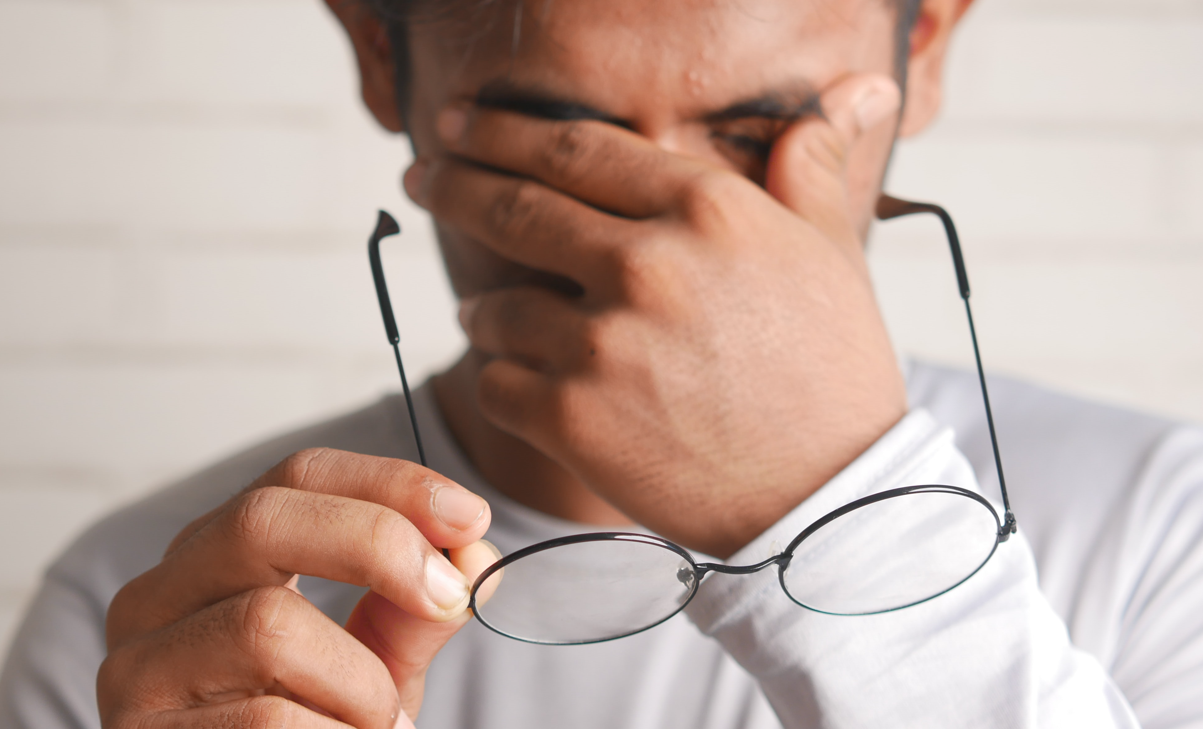Find out what you can do about that ringing in your ears
By Wendy Haaf
During an especially bad cold about 10 years ago, Riziero Vertolli of Mississauga, Ont., began to hear a ringing sound that didn’t seem to be coming from an outside source. Now 60, the media photographer and college instructor still hears it. The high-frequency noise “kind of floats around the affected ear,” he says.
The medical name for this type of phantom noise—which may also sound like clicking, buzzing, hissing, or chirping—is tinnitus, and it’s very common. According to a 2019 Statistics Canada study, 37 per cent of Canadians reported experiencing tinnitus within the previous year, with seven per cent saying it negatively affects their sleep, concentration, and mood. “Medically, tinnitus doesn’t hurt you, but it can wreak havoc on your quality of life,” Vertolli says.
What is tinnitus?
Tinnitus is a symptom rather than a disease. Typically, “it’s a sign that there’s damage along the auditory pathway,” explains Rodney Taylor, a Cornwall, Ont., audiologist with a doctorate and advanced training in treating tinnitus. The auditory pathway is the system of structures that carries sound signals to the brain. “It manifests itself in a variety of ways,” Taylor says. “It can be in one ear or both ears, or it can be perceived in the head. It can be constant or intermittent, and it can vary in intensity.” It can also be temporary or permanent. Temporary tinnitus can occur after you’ve attended a loud concert, for example, or as a result of an ear infection or impacted earwax.
Often, the damaged part of the system is the delicate hair cells in the inner ear that convert sound energy into electrical impulses sent to the brain. Common causes include aging, long-term noise exposure, and shorter- term exposure to very loud noise, such as explosions or gunfire. Certain medications (usually at higher-than-normal doses, taken over time) can sometimes cause similar harm. (If you ever begin to experience tinnitus after starting a new prescribed medication, don’t stop taking it on your own: talk with your doctor or pharmacist first.)
“Most tinnitus is caused by hearing loss,” says Dr. Jason Beyea, an ear physician and surgeon at the Kingston Ear Institute in Kingston, Ont., and an assistant professor and research director in Otolaryngology-Head and Neck Surgery at Queen’s University and Kingston Health Sciences Centre.
How can hearing loss trigger tinnitus?
We now know that tinnitus is generated by brain activity. The brain and ears are wired to constantly scan the environment for sound. When the sound signal traffic declines due to a decrease in hearing, the brain begins working extra-hard to glean information from the ear. This increase in brain activity is what causes tinnitus.
Can conditions other than hearing loss cause tinnitus?
Experts believe that other changes that affect the auditory system—such as an ear infection, fluid buildup in the middle ear (which can occur when you have a cold), or a buildup of wax—can have similar but temporary effects on the brain. In concussion—another cause of tinnitus—the initial problem usually doesn’t originate in the ear but within the brain itself. Concussion can damage nerve cells in the brain, and some research suggests that, since the auditory system is an extensive brain network, “a damaged neuron can sometimes attach to a healthy neuron, and that manifests itself as tinnitus,” Taylor says.
In a small minority of tinnitus cases, the culprit is one of a handful of other conditions, such as non-cancerous growths, or one of certain disorders of the circulatory system (some of which can cause tinnitus that’s audible to an outside listener through a stethoscope). There are two clues that point to these as potential causes. “If the tinnitus is unilateral [one-sided] or if it’s pulsatile [throbbing], you should seek medical attention from an ear, nose, and throat specialist to rule out any medical causes,” says Allison De La Lis, an audiologist and doctor of audiology at the Kingston Ear Institute. (Audiologists are independent hearing health professionals who specialize in the prevention of hearing loss and the identification, diagnosis, management, and treatment of hearing and balance disorders, including tinnitus.)
Whom should I consult if I don’t have these potential warning signs?
“If a patient is experiencing tinnitus, his or her first step should be to get a hearing test,” Beyea says. Most commonly, audiologists and hearing instrument specialists (called audioprosthetists in Quebec) administer hearing tests. Audiologists can also help you understand tinnitus and explain different treatment methods.
What treatments are there?
It’s not always necessary to do anything about tinnitus. “Some people just want an answer, and when I tell them ‘This is kind of normal for the amount of hearing loss you have,’ that’s enough for them,” Taylor says. “We then monitor them regularly for further hearing loss.”
But if tinnitus is disrupting your life by interfering with sleep or concentration or increasing your anxiety level, there are treatment options. It’s important to note, however, that the goal of “any tinnitus treatment is not to eliminate the tinnitus,” De La Lis says. “It’s to give you a tool box of skills to help you manage it”—and to minimize its effect on your life. And because every person is different, “we try to individualize the approach so that we can target things that will be helpful for that particular patient,” Beyea says.
One strategy that’s often effective is giving the brain more sound stimulation. “A large part of the population will put a hearing aid in and find that the tinnitus drops to a manageable level,” Taylor says. Turning up the volume of outside noises can make the tinnitus less noticeable. Hearing aids can also amplify speech above the perceived volume of the tinnitus, thereby improving your ability to follow conversations and participate in social activities. People with concussion-related tinnitus may also respond well to wearing hearing aids.
For example, Deirdre Gagnon*, of Gatineau, Que., developed tinnitus along with a constellation of other problems after her car ricocheted off a retaining wall in icy conditions. She consulted Taylor and began wearing hearing aids. “I started seeing improvements after just two months,” she says.
Many hearing aids and a range of other devices can be used to generate noise to partially mask tinnitus and help your brain ignore it. Sometimes, listening to a relaxing, neutral background sound such as crashing surf throughout the day can teach your brain to link the tinnitus to this meaningless sound and tune out both it and the tinnitus. It works a bit like adapting to wearing glasses: at first, you constantly feel them against your face, but eventually, your brain stops paying attention and the sensation disappears. With the extended use of a hearing aid or sound generator, your tinnitus may remain at bay for some time after you remove the device, Taylor says, with those quiet periods increasing in longevity over time.
“One of the big strategies to manage tinnitus if it’s bothersome is to avoid silence,” De La Lis says. “Many people don’t notice it during the day, but they do notice it when they’re trying to go to sleep. Using a sound-generating machine or an app or even just running a fan can be helpful. It’s about giving your brain something to listen to other than the ringing.”
During waking hours, De La Lis continues, “you should make sure you’re still engaging in activities that bring you enjoyment and in social activities such as going for a walk outside where there’s traffic noise, dogs barking, and the sound of the wind, or chatting with a good friend. You want to make sure you’re engaging because it’s giving your brain other stimulation.”
Are there other treatments?
“Tinnitus retraining therapy is an option for people who are very bothered by their tinnitus,” De La Lis says. “It’s a multi-faceted approach that looks at your emotional well-being; it takes into consideration sleep patterns, concentration problems, and your hearing, if that’s an issue. It uses a combination of cognitive behavioural therapy and management skills.”
“Cognitive behavioural therapy,” Taylor explains, “can help people get rid of the negative connotations of tinnitus and turn it around so that it’s more acceptable to them.” Vertolli, for example, says he’s learned to tell himself that he likes the noise. “It’s where I go to rest— it’s my happy place, my babbling brook.”
Could my diet or other lifestyle factors be contributing to my tinnitus?
“Some people find that alcohol can cause their tinnitus to become more noticeable, but others can completely cut out alcohol and caffeine and still experience tinnitus,” De La Lis says. Overall, there’s scant evidence that avoiding or consuming certain foods or beverages can worsen or improve tinnitus.
However, healthy habits can reduce your risk for conditions that have been linked to tinnitus, such as high blood pressure and diabetes. Eating a healthy diet and exercising regularly may help make tinnitus more manageable, too. “All of that fits into adequate sleep, and we know that when patients are not sleeping well, their tinnitus can be more bothersome,” Beyea says.
Sleep and exercise also moderate stress, which can worsen your ability to cope and increase your susceptibility to anxiety and depression. Stress and lack of sleep appear to increase the degree to which people are bothered by their tinnitus. “I’ll have a couple of bad days, and then I have days when I hear it but it doesn’t bother me as much,” Vertolli says. “Do the decibel level and frequency change? Not really—the difference is just my ability to deal with it.”
People with tinnitus seem more prone to experiencing problems with mental health: according to a 2019 study using survey data from 6,571 Canadians collected between 2012 and 2015, “the prevalence of a mood disorder such as depression or bipolar disorder was more than twice as high for those with bothersome (19 per cent) or non-bothersome (17 per cent) tinnitus than for adults without tinnitus (eight per cent).”
If you’re struggling with a mood disorder, treating it may help prevent the two conditions from feeding into each other, so you may want to explore different methods of doing so with your family doctor. For instance, while antidepressants won’t affect tinnitus itself, they’re sometimes prescribed to help “people be less stressed about the tinnitus,” Taylor explains.
Most of Beyea’s patients, however, start feeling better without medication. “Once we’ve investigated with a hearing test and talk to them about all of the different options, most of our patients are in a better position to manage their tinnitus,” he says.
Finding an Audiologist
• CASLPO (College of Audiologists and Speech-Language Pathologists of Ontario) caslpo.com
• Canadian Hearing Society chs.ca/service/tinnitusconsultations
• Speech Audiology Canada (click on “For the Public” tab) sac-oac.ca
• Links to provincial and territorial associations sac-oac.ca/provincialterritorialassociations
• Information on tinnitus Canadian Hard of Hearing Association chha.ca
• American Tinnitus Association ata.org
• British Tinnitus Association tinnitus.org.uk
Photo by William Krause on Unsplash






